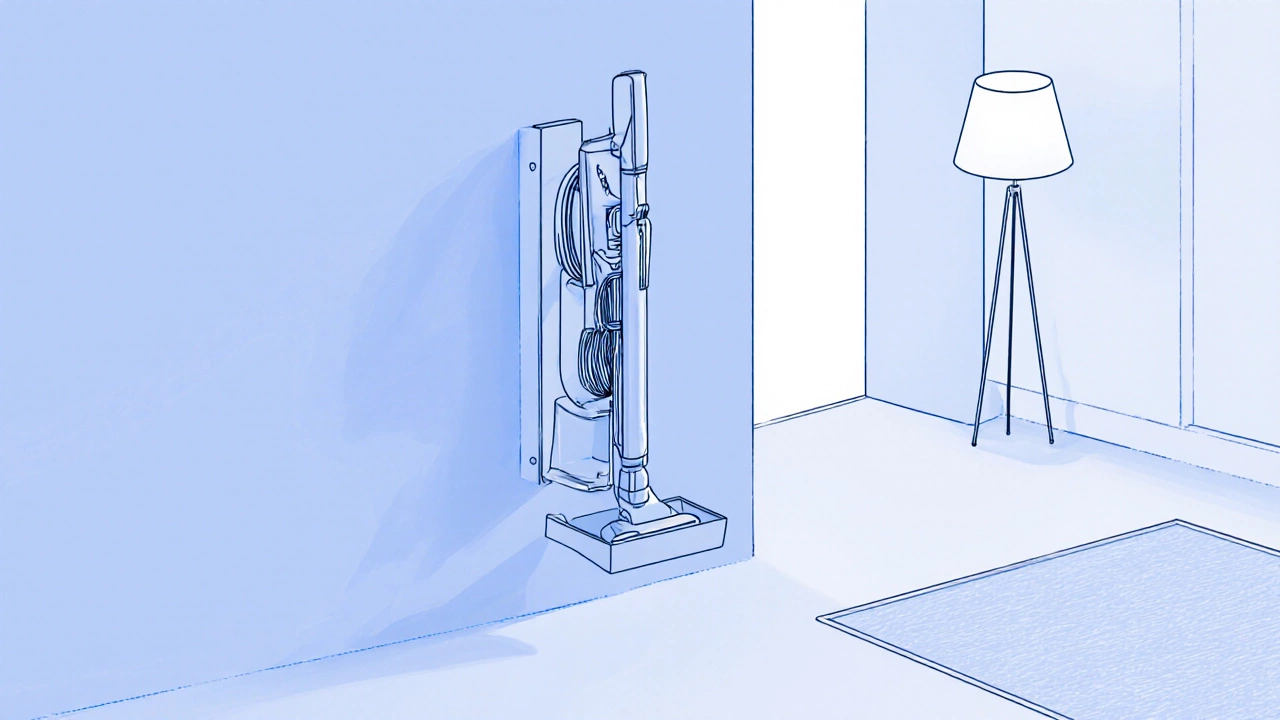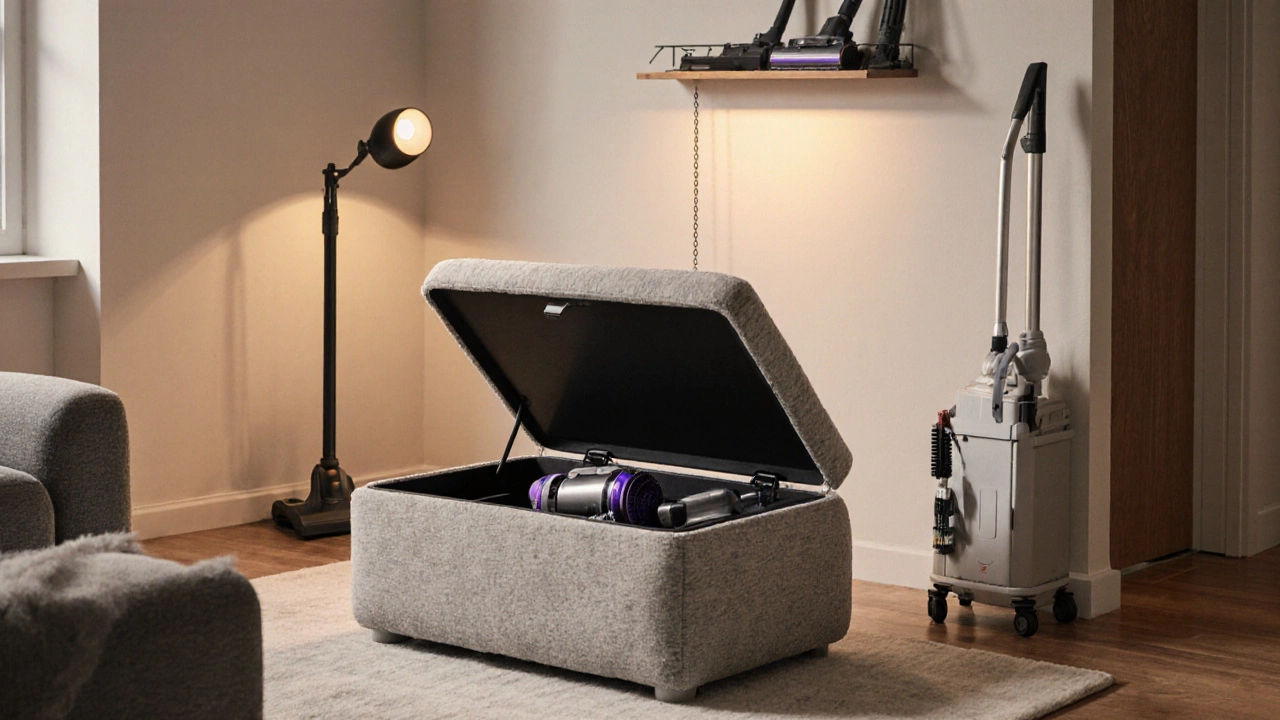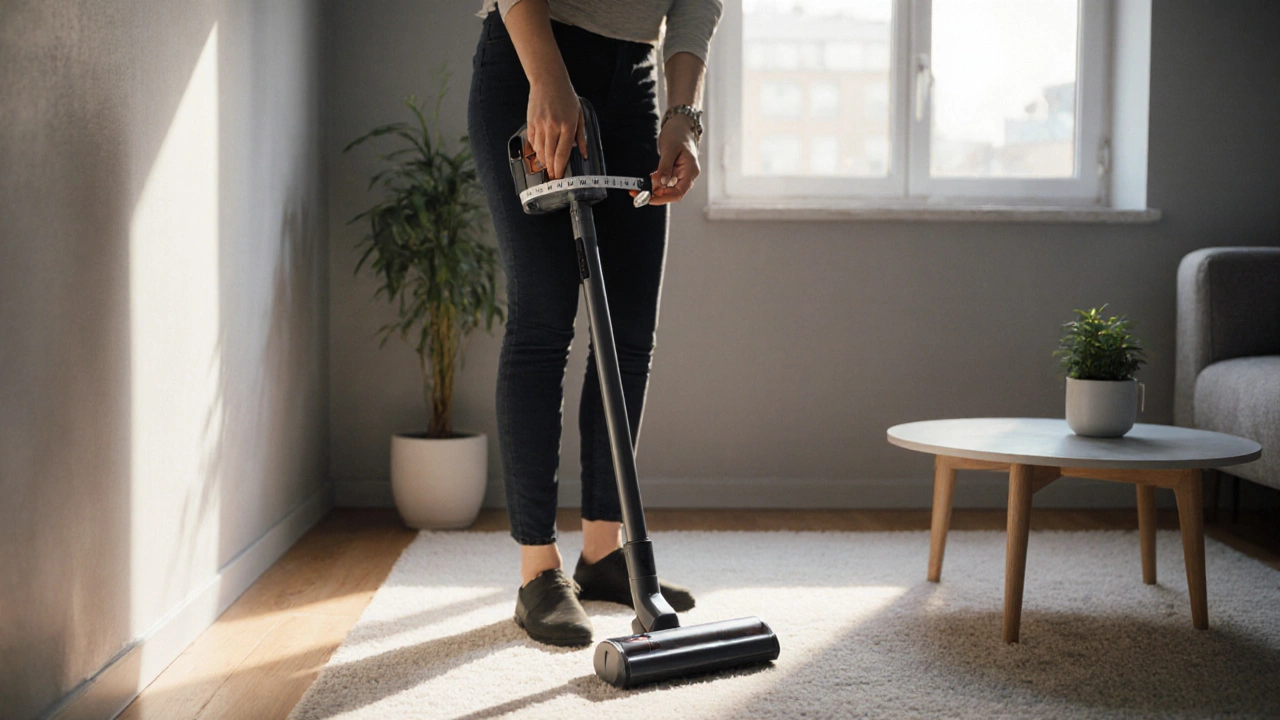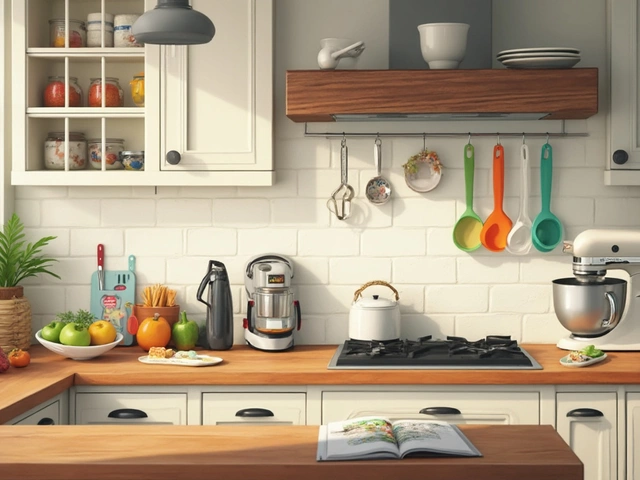Vacuum Storage Compatibility Calculator
Your Vacuum Measurements
Enter your vacuum's dimensions in inches
Available Space
Optional: Enter space dimensions (if known)
Enter your vacuum dimensions to see compatible storage options
Ever bought a powerful vacuum cleaner only to stare at a tiny apartment and wonder where the heck to put it? You’re not alone. Many renters and city‑dwelling homeowners lack a traditional closet and still need a tidy spot for a bulky appliance. Below you’ll find practical, budget‑friendly ways to stash your vacuum without sacrificing style or floor space.
Quick Takeaways
- Measure your vacuum’s dimensions before choosing a solution.
- Wall‑mounted brackets free up floor space and keep cords out of the way.
- Under‑bed storage works best for stick‑type vacuums.
- Multi‑purpose furniture lets you hide the vacuum while adding function.
- Always consider ventilation to avoid motor overheating.
Know Your Vacuum
First things first: understand the size, weight, and shape of your Vacuum Cleaner is a household appliance that uses suction to pull dust and debris into a collection bag or bin. It comes in several formats-upright, canister, stick, and handheld-each with different storage needs. An upright model can be 15‑20 inches tall and weigh 10‑15 lb, while a stick vacuum may be as slim as 2 inches wide and 30 inches long. Knowing these specs helps you match the right storage method to the right machine.
Map Your Available Space
Even without a closet, most homes have hidden nooks that can double as storage zones. Consider these common spots:
- Behind a door - the thin recess can hold a wall‑mounted hook.
- Under the bed - great for slim, stick vacuums.
- Above a kitchen cabinet - a ceiling shelf works if you have ceiling height.
- In the laundry room - cabinets there often have spare shelf space.
- Garage or utility room - wall studs provide sturdy anchor points.
Take a tape measure, jot down the width, height, and depth of each area, then compare those numbers to your vacuum’s dimensions.

Top Storage Solutions
1. Wall‑Mounted Bracket or Hook
One of the simplest fixes is a heavy‑duty Wall‑mounted bracket designed to hold vacuum cleaners securely on a vertical surface. Install it at shoulder height, and you instantly free up floor space. Most brackets come with a small tray for the power cord, keeping the plug tidy.
2. Under‑Bed Storage Box
If your bedroom has a raised platform, slide a low‑profile Under‑bed storage box with wheels or a smooth glide surface under the mattress. Stick vacuums fit perfectly; just pull the box out when you need to clean.
3. Multi‑Purpose Furniture with Hidden Compartments
Think of an ottoman, bench, or side table that opens up to reveal a cavity. Choose a piece that matches your décor and can accommodate the vacuum’s width and length. Some designs even include a dedicated shelf inside for the hose and accessories.
4. Rolling Caddy or Utility Cart
A compact three‑wheel caddy lets you roll the vacuum from room to room and tuck it away in a corner when not in use. Look for a model with a built‑in hook or strap to keep the hose from dangling.
5. Ceiling or High Shelf
In loft apartments, a sturdy ceiling shelf can hold a lightweight stick vacuum. Install a reinforced bracket and use a short chain or strap to lower the vacuum when you need it.
6. Laundry Room Cabinet or Pantry Shelf
Many homes have a small cabinet in the laundry area that’s rarely used. Repurpose a shelf inside for the vacuum, and keep the bag or bin on the floor beneath. This keeps the machine out of sight but still easy to access.
7. Garage Wall Hooks
If you have a garage or utility room, wall studs provide the perfect anchor for a heavy‑duty hook. Pair it with a magnetic strip for the smaller attachments (nozzle, brush roll) to keep everything together.
Comparison of Storage Options
| Option | Space Needed | Cost (NZD) | Best For | Key Drawback |
|---|---|---|---|---|
| Wall‑Mounted Bracket | None (vertical wall) | 15‑30 | Upright or canister vacuums | Requires drilling |
| Under‑Bed Box | Low profile under bed | 20‑40 | Stick vacuums, light canisters | Hard to reach in low‑profile beds |
| Multi‑Purpose Furniture | Built‑in cavity | 80‑200 | Adding storage while upgrading décor | Higher upfront cost |
| Rolling Caddy | Floor footprint, movable | 25‑50 | Frequent room changes | May wobble on uneven floors |
| Ceiling Shelf | Above head height | 30‑70 | Light stick vacuums in lofts | Installation complexity |
| Laundry Cabinet Shelf | Inside existing cabinet | 10‑20 (DIY) | Small homes with laundry area | Limited space for large vacuums |
| Garage Wall Hook | Wall surface | 15‑35 | Heavy-duty vacuums, extra accessories | Not ideal for living‑room aesthetics |

DIY Tips to Keep Your Vacuum Safe
- Ventilation matters: Never store a vacuum in an airtight box. Allow air to circulate to prevent motor overheating.
- Cord management: Use Cable management clips to coil the power cord neatly before tucking the machine away.
- Secure accessories: Keep the brush roll, crevice tool, and dusting brush on a magnetic strip or small tray attached to the same bracket.
- Weight distribution: For heavy vacuums, make sure the hook or bracket is rated for at least double the unit’s weight.
- Label the spot: A simple label helps guests know where the vacuum lives and avoids accidental bumps.
Decision Checklist
- Measure your vacuum’s height, width, and depth.
- Identify any vertical surfaces that can support a bracket.
- Check for low‑profile spaces like under the bed or inside a cabinet.
- Consider the aesthetic impact - will the storage method blend with your décor?
- Set a budget - most solutions range from $15 to $200.
- Plan for easy access - you should be able to pull the vacuum out in under 30 seconds.
Cross‑checking these items will steer you toward the option that feels natural in your home.
Frequently Asked Questions
Can I store a bagless vacuum without damaging the filter?
Yes, as long as the storage spot allows airflow. Avoid sealed containers; a breathable box or open shelf works best. Keep the filter dry and dust‑free by cleaning it before storage.
What if I rent and can’t drill holes?
Look for adhesive‑backed hooks or tension‑rod brackets that grip the wall without damage. A freestanding rolling caddy is another renter‑friendly choice.
Is it safe to store a vacuum on a ceiling shelf?
Only for lightweight stick vacuums. Make sure the ceiling joists can bear the weight and that the shelf is securely anchored. Use a short pulling chain so you can lower the vacuum safely.
How often should I reorganize my vacuum storage?
Twice a year is a good rule - once after the winter cleaning season and once before summer. It gives you a chance to check the cord, filter, and any accessories.
Do vacuum storage ideas cost a lot?
Not necessarily. Many effective solutions-like a simple wall hook or a repurposed under‑bed box-can be found for under $20. The key is matching the solution to your vacuum’s size and your home’s layout.
With a little planning, you can keep your vacuum clean, accessible, and out of the way-even when you don’t have a closet. Pick the solution that matches your style, budget, and space, then enjoy a clutter‑free home.







